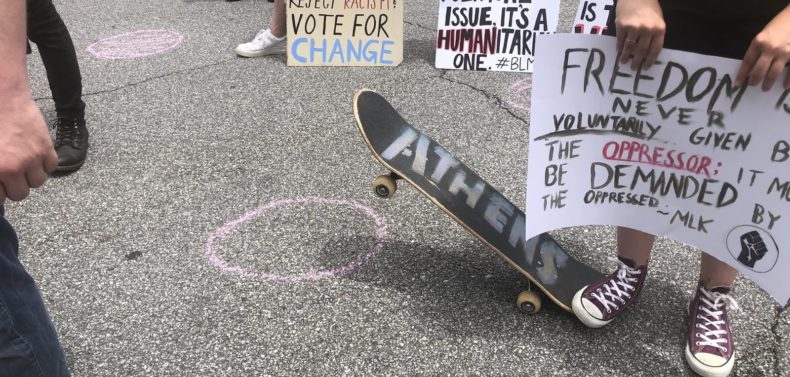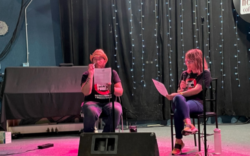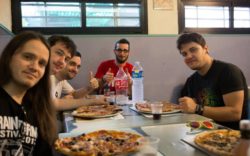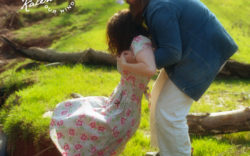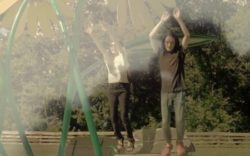One day after Breonna Taylor’s birthday and nearly one week after the death of George Floyd, a few friends and I—along with over a thousand other folks—attended the rally hosted by the Athens Anti-Discrimination Movement (AADM).
In the days leading up to the rally, silent protests have been held in downtown Athens near the Confederate monument on Broad Street’s median, and fortunately, the monument has been called on for its relocation by Mayor Kelly Girtz and many of the commissioners. The recent global unrest has not only culminated into many monument removals in the South, but a turning point for the ongoing Black Lives Matter movement against police brutality, and the larger movement against systemic racism—It’s an incredible time to be alive.
After the March for a World Without Cops protest on Sunday evening, and hearing about the unnecessary tear gassing and unlawful arrests of peaceful protesters later that night, I spent several days laying in my bed overwhelmed with many emotions. In my waking hours, which were few, I spent time reading countless news articles, signing and sharing petition information, sharing related art and poetry, and doing other seemingly menial tasks to make myself feel better about not physically showing up.
I learned about “crisis fatigue” and listened to a live conversation from To Write Love on Her Arms, both of which validated the need for breaks in this marathon. As AADM co-founder and Georgia State House candidate Mokah Jasmine Johnson said at the Justice for Black Lives rally, “This is not a moment. This is a movement.”
I pushed myself to go with a friend downtown Friday. On the hour, every hour, we knelt in Breonna’s memory. The constant honks of solidarity were like a symphony, sending chills over my body and tears to my eyes. The waves and raised fists consistently came and went. People randomly walked up with supplies or passed them through their car window. The unity was beautiful. We the people.
Despite COVID-19 still wreaking havoc—a reality made clear when Athens-Clarke County Commissioner Mariah Parker tested positive—and my mother’s text messages voicing her understandable concerns over my mental and physical health, attending protests remains part of my responsibility. Signing petitions that impart legislation reform is part of my responsibility. Donating to various organizations that support this cause, when I can, is part of my responsibility. Educating myself, which includes listening to lived experience, is part of my responsibility. Educating others, when I know it isn’t a futile effort, is part of my responsibility. Documenting these events is part of my responsibility. I have love, and I must act on it in any way I can, when I can. I am white, and I believe that it’s my responsibility to utilize my privilege in these ways.
“Everyday I walk out of my front door, I live in fear,” said AADM’s Mokah Jasmine Johnson in her opening remarks at the rally. “COVID is one thing I have to worry about, but I also have to worry about being a black mother. I have to also worry about my sons, my brothers. I have to worry about my sisters—people that are being shot down in these streets.” Needless to say, we’re living in a tumultuous time when COVID-19 happens to be the backdrop for a wildly important movement, but the fight must go on.
On the way to the rally, friends and I passed cops lining the sidewalk. Some acknowledged us, and some didn’t. It was naturally awkward because we were protesting against police brutality.
As we neared the stage, we were welcomed by the sounds of street percussionist Calvin Klampton vibrantly bucket drumming in front of the aforementioned Confederate monument.
Continuing, we passed a man geared up with foam cut-outs wrapped around his body, deeming himself part of the “Citizen Protection Squad.”
A water bottle station was set up a block away from the stage. There were more volunteers moving through the rally’s crowd with water and hand sanitizer. At the beginning of the nearly three-hour event, a man closer to the stage collapsed to the ground, and many instantly encircled him, wafting fans to cool him down. While this is a difficult time, nurturing actions like these are lights along the long tunnel to real change.
In front of the stage, the six-foot social distancing recommendations were outlined in chalk, but were soon made invisible by the thousands who gathered over them.
Signs were posted in many spots around the area to remind us of what was posted on the event’s Facebook page:
“A protest requires articulated demands. Can you sign our petition by going to bit.ly/GAjusticepetition or texting AADM to 31996?
What are some of the policy changes we are demanding?
– The adoption of H.B. 426, an LGBTQ-inclusive, bipartisan hate crimes bill in Georgia, one of four states in the United States without hate crimes law.
– The passage of H.B. 636, The Use of Force Act, a bill that requires all state and local law enforcement departments to create a ‘use of force’ database that is accessible by the public.
– The repeal of Georgia Citizen’s Arrest Law that is being claimed as a defense in the murder of Ahmaud Arbery.”
Although this was intended to be a peaceful protest and was maintained as such, helicopters, drones and policemen positioned on a nearby building hovered over the rally, monitoring all of us shouting “our streets” from below.
Once the rally ended, many stayed put to continue protesting in the streets—our streets. I moved to Athens only last year, but I have so much pride in this city and in its many voices demanding radical change.
I’ve been touring potential homes, and on a desk inside of a leasing office, there’s a sign that reads the cliché, “Be the change you want to see.” I’m not always up to par with what I find to be sufficient action because there’s always more to be done, and like Johnson said, “We have a fucked-up system.” It’s especially difficult to implement change when I have cognitive dissonance galore, such as writing this essay with the words “virtue signaling” and “performative” blinking in my mind, and rethinking the sort of pity party I described, knowing that I am white, and because of that luck of the draw, I’ve lived a life without many of the obstacles black people have endured.
There are also differing opinions on what to do and what not to do from other people, such as being called unreasonable for ending, or almost ending, a years-long friendship based on political views, but simultaneously being questioned by others for holding on to it whatsoever.
Sometimes I swim in confusing gray areas, and in other instances, black and white is undoubtedly discernable. All I can do is try to respect the process of it all, within the largest civil rights movement in history, and thereafter.
Like what you just read? Support Flagpole by making a donation today. Every dollar you give helps fund our ongoing mission to provide Athens with quality, independent journalism.



